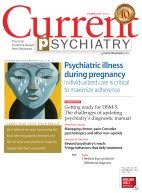Thursday, May 6, 2010
Antidepressants in bipolar disorder
Joseph F. Goldberg, MD Associate clinical professor, Department of psychiatry, Mount Sinai School of Medicine, New York, NY, Affective Disorders Research Program, Silver Hill Hospital, New Canaan, CT
Few topics are as controversial as the role of antidepressants for patients with bipolar disorder. Although depression usually is the predominant, most enduring mood state in bipolar disorder, clinicians often face uncertainty about using antidepressants because of concerns about safety and efficacy. Whether and when to use antidepressants for bipolar depression hinges on complex parameters that preclude any single, simple rule.
Rather than asking if antidepressants are useful or detrimental for depressed patients with bipolar disorder, a more practical question might be: Under what circumstances are antidepressants likely to be beneficial, deleterious, or ineffective for an individual patient? Because “real world” patients often have idiosyncrasies that defy practice guidelines’ generic treatment recommendations, clinicians who practice in the proverbial trenches need strategies to tailor treatments to each patient that are informed—but not dictated—by evidence-based research.
Read full text (free access)
Comment on this article
Email the editor
Subscribe to:
Post Comments (Atom)


But just what is an antidepressant. A respected academic just suggested in a psychopharm listserve that gabapentin should be used with caution in a bipolar patient because it might have minimal antidepressant effects. Is quetiapine an antidepressant? What about scopolamine? There is evidence. Not to mention the stimulants. The FDA seems to classify drugs solely based on their approvals, and yet fluoxamine didn't suddenly become an antidepressant the day it was approved for that indication by the FDA.
ReplyDelete